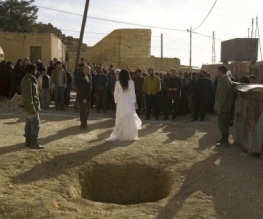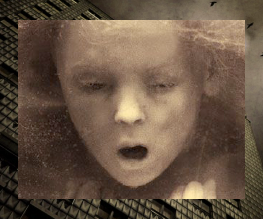The Stoning of Soraya M

When the French-Iranian journalist Freidoune Sahebjam (Caviezel) finds himself stranded deep in the Iranian countryside with a broken down car, the last thought to cross his mind is one of journalistic inquest. A passing bus tows him to the local town, where a persuasive amount of money sees Hashem, the neighbourhood mechanic, agree to fix his blown radiator. Yet Sahebjam’s arrival sparks an unusual degree of interest in the town’s elders -why are they so intent on keeping an eye on his business in their remote town? It’s not until he manages to obtain a private audience with Zahra (Aghdashloo) that Sahebjam discovers why the air is thick with whispers.
Zahra has a story to tell, and it’s her hope that the journalist might be able to “take her voice” with him, to spread it to the world. But Sahebjam is reluctant to become involved with small-town spats – what could possibly be worth his time?
Zahra wishes to tell Sahebjam about her niece, Soraya (Marnò), who was a favourite of many in the town; she was a gentle woman and a good Muslim with a good reputation. Yet many knew that her relationship with her husband Ali was far from ideal. Ali, a prison officer, had reached a point of frustration with his wife of 20 years, and felt that he deserved a new wife. When Soraya is approached by the mullah (Muslim man taught in theology and law) to offer Ali’s request for divorce, she creates a stir by rejecting the offer. Ali is enraged, and swears to take their two sons with him when he moves to the city with his new wife to be, (Mehri, a 14 year old girl with a rich father who owes Ali a favour), leaving Soraya and their two daughters as outcasts.
A solution presents itself with the loss of Hashem’s wife. Soraya is employed to care for Hashem and his disabled son, earning her a wage and some time away from her difficult husband. But, faced with a costly divorce, Ali isn’t satisfied with the arrangement – he sees an opportunity to have Soraya killed for adultery. The story that Zahra is desperate to tell the world is what happened to her innocent niece at the hands of a town far too easily persuaded by its corrupt male hierarchy.
The very fact that the title of this film forewarns its ultimate conclusion robs it of a vital aspect of its drama – I had never come across this story (which occurred in Iran in 1986), and could have been on the edge of my seat wondering if Soraya were to find justice. But no, as the title tells us, she’s a goner from the off, and with the element of surprise goes any real potential for a truly gripping story. Ali, rather than developing into a character, becomes a villain of panto proportions, driving around in his shiny American convertible and leering whenever possible. But the shoddy bad guy isn’t the weakest point of The Stoning of Soraya M though, as this harrowing story isn’t allowed to bring you to tears by its own merit – a soundtrack of wailing Arabic choirs and pipes is on hand to give you a good kick in the emotions during almost every scene.
That’s where The Stoning of Soraya M fails. Where it succeeds, is in delivering one of the most brutal climaxes of any film I’ve ever seen. It’s so spectacularly directed and shot that it sucks in any possible sceptic that might feel this has been a heavy handed approach to deliver a harrowing story. The way in which The Stoning of Soraya M highlights the unjust plight of those who are sentenced to a death this barbaric makes it a worthwhile film experience. You won’t enjoy it, and you might be critical of its portrayal of Islamic law, but it’ll definitely get you talking.






Recent Comments